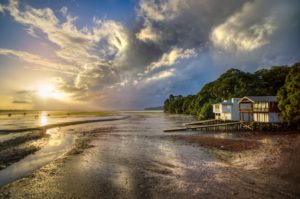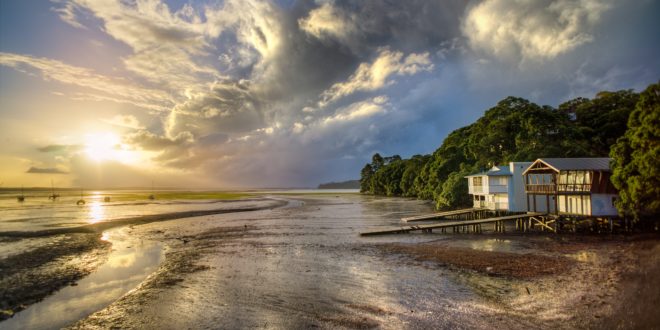 Average global sea levels have been slowly rising since the end of the so-called “little ice age” about 200 years ago. The rate of rise is almost linear and is roughly 200 mm per century. However, the notion of an average rate of rise is really an artifice – sea level rise is intensely regional and there are some parts of the world where there has been no sea level rise at all, and others where the actual rates have been twice the average – and so on. The calculation is also complicated by movements in land level. I think the rate of rise in New Zealand is not too far from the average.
Average global sea levels have been slowly rising since the end of the so-called “little ice age” about 200 years ago. The rate of rise is almost linear and is roughly 200 mm per century. However, the notion of an average rate of rise is really an artifice – sea level rise is intensely regional and there are some parts of the world where there has been no sea level rise at all, and others where the actual rates have been twice the average – and so on. The calculation is also complicated by movements in land level. I think the rate of rise in New Zealand is not too far from the average.
The risks this impose are two-fold – there is a general risk of inundation from rising sea levels, and the impact of extreme weather events from off the sea (storms, cyclones etc) is heightened because they are occurring off a higher base.
There is no sign of sea level rise stopping or reversing, and there have been various predictions of an acceleration in the rate of increase – either as a reflection of rising global temperatures or catastrophic events such as the melting of the Greenland ice sheet or the Western Antarctic ice sheet. Some of the science around this is quite contentious. This does make it difficult to establish benchmarks or reference points, for deciding on what actions to take in response. My own view is that the historical rate of rise of about 200mm per century should be regarded as both close to the minimum and also most probable, but with a significant probability of rates of increase higher than that. In other words, I think the probability curve is quite asymmetric.
So what should we do about this?
The key problem area is, of course, the coast and this includes many of our major cities. The simple answer to the problem is that all commercial and housing development should be banned where the ground level is less than a set height above sea level and any development is set back less than a minimum length from the high water mark. For argument’s sake these numbers might be a height of 5 m and a set-back length of 100 m – it all depends on how risk-averse we wish to be and what probability we put on different of rates of rise. And the appropriate numbers will probably vary from one location to another. Development might be banned altogether in situations of unavoidable and active erosion such as construction on new or old sand dunes, sites which are already at or below sea level, or on sites which have direct exposure to large and destructive ocean waves.
For undeveloped land, such a policy is relatively easy to apply because there is little existing investment. I say relatively because New Zealanders like living near the coast, and any restriction on new coastal development is likely to be unpopular. This particularly so in the major cities, where waterfront developments are much sought after. So far as residential development is concerned, I think it would be fair for the community as a whole – through the relevant local body – to offer to buy out the existing landowner and turn the property into reserve land. I say offer because in some cases the owner may wish to continue to use the land, for example as a camp or caravan site, but in such cases, a decision not to sell should be permanent, i.e. it should be a once and only offer. Owners who waived the option of selling would have to bear the risk involved.
The situation is much more complicated if development has already occurred. In these cases, the option of buying out property owners at market value would be prohibitively expensive, particularly in the cities. Putting a caveat on any future on-selling of properties would also be problematic as it would effectively make the properties impossible to sell and thus reduce the effective value to close to zero. I think this is a situation where the only fair and affordable solution would be for the local body and the property owner to share the financial risk, ie for the local body to be committed to purchase of the property at an agreed discount from the current market value. To prevent speculation the purchase offer should be frozen at that level for all time. It would also be appropriate – and defer the financial costs – if the existing property owner was given a right for the continuation of the existing use by that owner. If sea level rise turned out to be much less than anticipated the deferral of cost might be effectively indefinite.
None of these actions are easy and they all carry a cost, but this has to be judged against the potential cost of doing nothing. Because of the uncertainties involved, experience to date is that “at risk” property owners are inclined to hang on and resist actions by local bodies such as those discussed above. Time will tell whether this turns out to be a sensible approach or not but experience to date does indicate that we should be cautious about moving too quickly. Sime dire predictions have been made but they have generally turned out to be overly pessimistic.
A good indicator may be ongoing trends in the cost of insuring coastal properties. Insurance companies are in the business of assessing risk and making a profit in the process, and this means that the cost of insuring coastal properties is bound to rise and may reach the point of being unaffordable – particularly for properties which are clearly at risk. In this situation, the only other option may be to abandon the property which effectively means that the whole cost falls on the property owner. Far better to act sooner rather than later while solutions which share the cost with the community are still likely to be “on the table.”
A core issue in all of this is that of timing. There are few that would argue that the sea will stop rising at some point and therefore we should do nothing, ie we should not incur costs which turn out to be unnecessary. I think the prevailing view is that sea levels will continue to rise and the gut issue is when we act rather than whether we should act. In this respect, I think it is all eyes on the Government and to some extent the insurance industry because they will set the agenda.
By Bas Walker
This is another of Bas Walker’s posts on GrownUps. Please look out for his articles, containing his Beachside Ponderings.









Join the Discussion
Type out your comment here:
You must be logged in to post a comment.